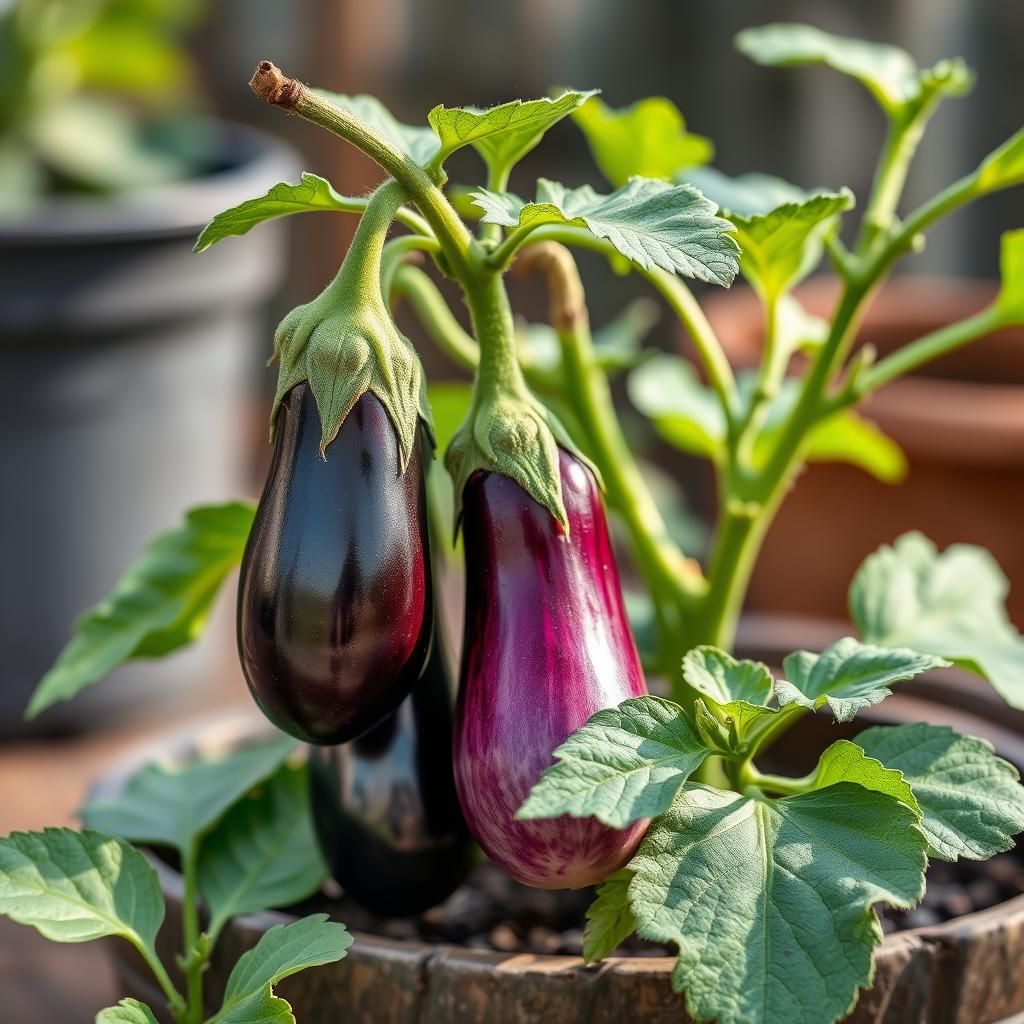Ultimate Guide to Eggplant Growing in Containers: Tips for Successful Gardening

Growing eggplants in containers is an excellent way to cultivate this delicious vegetable, especially for those with limited garden space. This ultimate guide will walk you through essential tips and techniques to ensure successful eggplant gardening in pots. From selecting the right container and soil mix to understanding watering and sunlight requirements, we’ll cover everything you need to know. Whether you're a seasoned gardener or a beginner, this comprehensive guide will help you nurture healthy, robust eggplants, resulting in a bountiful harvest. Get ready to discover the joys of container gardening and elevate your culinary adventures!
Tips for Growing Eggplants in Containers
Growing eggplants in containers can be a rewarding and space-efficient way to cultivate this vibrant vegetable. To successfully grow eggplants, it's essential to select the right container size—at least 5 gallons—to provide enough room for the roots. Ensure that the container has proper drainage holes to prevent waterlogging, and fill it with high-quality potting soil that retains moisture yet allows for good airflow. Position your containers in a spot that receives at least six to eight hours of direct sunlight each day, as eggplants thrive in warm conditions. Regular watering and fertilizing throughout the growing season are also key to producing healthy and productive plants.
Choosing the Right Container Size
Choosing the appropriate container size is crucial for successful eggplant growth. A minimum of 5 gallons is recommended, but larger containers will support better root development and overall plant health. Ensure that the container is deep enough to accommodate the eggplant's robust root system, typically requiring at least 12 to 18 inches of depth. This depth not only promotes strong growth but also helps retain moisture and nutrients.
Soil Requirements for Eggplants
Eggplants require rich, well-draining soil to flourish. A high-quality potting mix with organic matter, such as compost or peat moss, is ideal for container-grown eggplants. This type of soil retains moisture while allowing excess water to drain away, preventing root rot. Additionally, consider supplementing with a slow-release fertilizer to provide the necessary nutrients throughout the growing season, focusing on a balanced nutrient profile to support both foliage and fruit production.
Watering Techniques
Consistent watering is vital for the health of container-grown eggplants. The soil should be kept evenly moist but not saturated. An effective technique is to check the top inch of soil; if it feels dry, it’s time to water. Ensure that water is applied deeply, allowing it to penetrate the root zone. Be cautious of fluctuations in soil moisture, as both drought stress and overwatering can adversely affect the growth and yield of your plants.
See also:
Providing Adequate Sunlight
Eggplants thrive on full sun exposure, requiring at least six to eight hours of direct sunlight each day. When growing in containers, positioning them in the sunniest part of your yard or patio can significantly enhance plant growth and fruit production. If natural sunlight is limited, consider using grow lights to supplement their light needs, particularly during the early growing season or in less sunny areas.
Pest Management in Container Gardening
Managing pests in container gardens is crucial for maintaining healthy eggplants. Common pests include aphids, whiteflies, and spider mites, which can affect growth and fruit quality. Regularly inspecting your plants for signs of infestation is essential. Utilizing organic pest control methods, such as neem oil or insecticidal soap, can help mitigate these issues without harming beneficial insects. Additionally, keeping the containers clean and removing any debris can prevent pest proliferation.
| Aspect | Recommendation |
|---|---|
| Container Size | At least 5 gallons |
| Soil Type | Rich, well-draining potting mix |
| Watering | Evenly moist, check top inch |
| Sunlight | 6-8 hours of direct sunlight |
| Pest Control | Organic methods like neem oil |
Choosing the Right Container for Eggplant
Selecting the appropriate container is crucial for successful eggplant gardening. Eggplants require adequate space for their roots to grow; therefore, a container should be at least 5 gallons in capacity. Materials like ceramic, plastic, or fabric can be effective, but ensure that the container has drainage holes to prevent overwatering, which can lead to root rot. Consider the weight of the fully grown plant, as it can become quite heavy with fruits, and make sure the container can be moved if necessary. Additionally, using a sturdy trellis inside the container can aid in supporting the eggplant plant as it matures.
Soil Requirements for Container Eggplants
The soil quality used in eggplant containers significantly influences plant health. A well-draining, nutrient-rich mix is essential, typically comprising potting soil, compost, and perlite or vermiculite for aeration. This ensures that the roots receive sufficient oxygen while retaining enough moisture. An ideal pH level for growing eggplants is between 6.0 and 7.0, so consider testing your soil and amending it with lime or sulfur as necessary. Regularly adding organic matter or a balanced fertilizer can also promote healthy growth and fruit production.
Watering Practices for Container-Grown Eggplants
Proper watering techniques are vital for maintaining healthy eggplant plants in containers. Consistent moisture levels are essential, as eggplants thrive in evenly moist soil. Water the plants deeply when the top inch of soil feels dry, ensuring that water reaches the roots and allows for proper drainage. Avoid letting the soil become soggy, as this can lead to fungal diseases. During hotter months, you might need to water more frequently, so monitoring soil moisture is key to preventing stress on the plants.
See also:
Light Requirements for Eggplants in Containers
Eggplants thrive in full sun, requiring at least 6 to 8 hours of sunlight per day. When growing them in containers, finding a suitable location that receives ample light is crucial for optimal growth and fruiting. Be mindful of potential shadows cast by surrounding structures or plants, and consider rotating the containers periodically to ensure even light exposure. If natural sunlight is limited, you may also explore using grow lights to supplement illumination during the growth phase.
Pest Management for Container Eggplants
Container gardening can help reduce some pest pressures, but it's still important to remain vigilant against common pests such as aphids, spider mites, and flea beetles. Regularly inspect the plants for any signs of infestation and use organic pest control methods when necessary, like neem oil or insecticidal soap. Encouraging natural predators, such as ladybugs, can also aid in managing pest populations. Additionally, maintaining healthy plants through proper watering and fertilization can enhance their resilience against pests.
Harvesting Tips for Container Eggplants
Knowing the right time to harvest your eggplants can greatly affect the quality and flavor. Harvest when the fruits are shiny and firm, typically when they're about 6 to 8 inches long. Use a cutting tool to avoid damaging the plant, and be careful not to pull on the fruit, as this can harm the branches. Regular harvesting can encourage the plant to produce more fruit, leading to a bountiful crop. Remember, overripe eggplants can become bitter and tough, so it's better to harvest too early than too late.
Questions from Our Readers
What type of container is best for growing eggplants?
The best container for growing eggplants is one that is at least 5 gallons in size with good drainage. This allows enough room for the roots to grow and prevents water from accumulating, which can lead to root rot.
How much sunlight do eggplants need when grown in containers?
Eggplants require full sun, which means they should receive at least 6 to 8 hours of direct sunlight each day. Positioning your container in a sunny spot will help your eggplants grow robustly and produce abundant fruit.
See also:
What type of soil is ideal for container-grown eggplants?
Using a well-draining potting mix that retains moisture is ideal for container-grown eggplants. Look for a mix that contains organic matter, such as compost, to ensure the plants receive the necessary nutrients during their growth cycle.
How often should I water my eggplants in containers?
Eggplants in containers need to be watered regularly, typically when the top inch of soil feels dry. It's important to keep the soil consistently moist, but avoid overwatering, as this can cause waterlogging and harm the plant's health.

If you want to read more articles like Ultimate Guide to Eggplant Growing in Containers: Tips for Successful Gardening, we recommend you check out our Pots category.
Leave a Reply
Related Articles